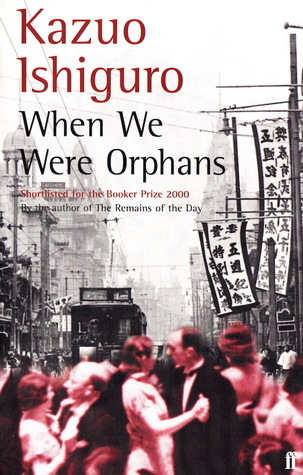 England, 1930s.
Christopher Banks has become the country's most celebrated detective,
his cases the talk of London society. Yet one unsolved crime has always
haunted him; the mysterious disappearance of his parents, in Old
Shanghai, when he was a small boy. Now, as the world lurches towards
total war, Banks realises the time has come for him to return to the
city of his childhood and at last solve the mystery - that only by his
doing so will civilisation be saved from the approaching catastrophe.
England, 1930s.
Christopher Banks has become the country's most celebrated detective,
his cases the talk of London society. Yet one unsolved crime has always
haunted him; the mysterious disappearance of his parents, in Old
Shanghai, when he was a small boy. Now, as the world lurches towards
total war, Banks realises the time has come for him to return to the
city of his childhood and at last solve the mystery - that only by his
doing so will civilisation be saved from the approaching catastrophe.Moving between London and Shanghai of the inter-war years, When We Were Orphans is a story of memory, intrigue and the need to return; of a childhood vision of the world surviving deep into adulthood, indelibly shaping and distorting a person's life.
Comment: I was at my local library and this book caught my eye. I knew the author is this year's Nobel Prize winner but while I didn't run to get his books immediately, I still remembered and considering this book wasn't too big, I thought it would be a good way to know his work and see if I could also think he deserved the prize.
This book is focused on Christopher Banks, an english man who has lived his childhood in Shanghai and now has a career as a detective, simply because he has had this golden image of detectives in China, looking for his missing parents.Although years have passed, the mystery remains until Christopher finally decided it's time for him to return and use his currently famous skills to uncover what happened so many years ago. But will Christopher like what he finds?
Reading this book was quite an experience. It's not a big book but I confess I wasn't always able to easily focus on what I was doing and often I was easily distracted. Still, it was very interesting to follow the mystery of the disappearance of Christopher's parents, especially because the outcome wasn't what I expected, even if I suspected something on those general lines.
Many readers have commented one of the biggest struggles is the lack of connection with the narrator, Christopher, because he is seen as just a character looking for a goal at the expanse of other details, and we never get to really know him and his thoughts on mundane things, such as how he solves the mysteries in his work. However, I didn't really mind not having more of Christopher's ideas as a grown up. The real beauty in his character is how he has manage to retain so many memories of his past and this clouds him today. One could say this isn't precisely a matter of beauty, but the writing has its appeal in this: we are carried along with Christopher to what he sees and wants to know and not as much the outside details that could have let us engage with his personality more, but...
What really made me like this book was Christopher's detailed images of his past. It's a known fact when we grow old, when we grow up, many of the things that used to make us us are gone, are dismissed, are put aside as fancy childhood phases. We remember this and that but it's gone, it's forever in the past and we can't live it again. Christopher has moved from Shanghai to England but his home will always be Shanghai in a way. How incredibly sad this can be, this need to hold on to things that used to be so fierce and engraved in one's mind but then they disappear. Christopher just focused on this, so he could not only regain his childhood feelings but the way he saw himself at that time. Finding his parents was like finally remembering there was a missed light to turn off after leaving the house and Christopher wants closure but that's not easy to accomplish.
The secondary situations that are part of this book, even the characters, all that almost seems to lack importance but we can see it's just a means for Christopher to remember and to let us know why his demand can't be over until he finds his parents.
I won't reveal the end, the twist but I shed one or two tears when Christopher finds the truth about everything that happened and although I can say it was rather melodramatic, it was interesting to squeeze it all to one basic sentence: our memories can be deceiving, we only remember things partially but the love of a mother can be...everything, forever.
Since I could overlook pretty much everything but Christopher and his wish to find a truth for what his memories meant and still do, this book was a good one for me. But I can understand many readers there are many flaws overall to make it a success. But well, each person sees things differently... I do agree the last 40 pages or something were somehow too weird but... in general, I can say I liked it.
Grade: 7/10
No comments:
Post a Comment